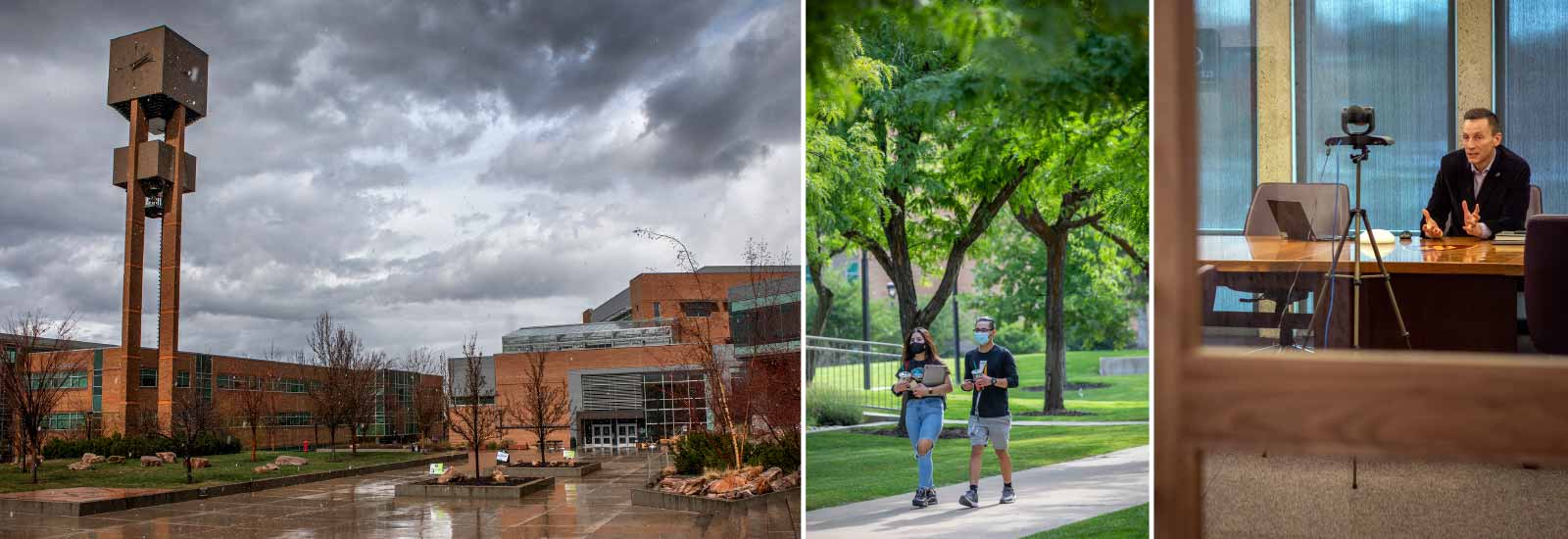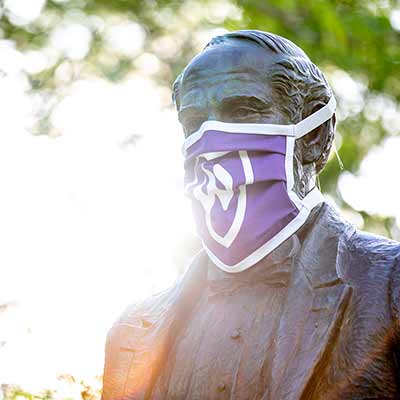The COVID-19 pandemic cost jobs, wages and time with family, as well as increased death, loneliness and sorrow, worldwide.
As many in our Wildcat family felt the toll of the pandemic, our flame burned bright. Before the first reported WSU case of the virus in March, Weber State put emergency plans in action and prepared to go virtual. Classes went online, staff and faculty began working remotely, WSU Athletics suspended events and spring commencement was rescheduled. Extra sanitary precautions were put in place to protect the community, from the residence halls to testing centers to Stewart Library.
Events like the Outdoor Weber entrepreneurship competition and Intermountain Sustainability Summit were held virtually. Summer classes, too, were held online.
Coronavirus Aid, Relief and Economic Security (CARES) Act funding allowed the university to help students who incurred expenses due to campus disruption during spring semester. Amounts ranged from $100 to $500 to cover expenses such as food, housing, healthcare, technology, course materials and childcare. CARES Act funds were also made available for students in the summer and fall 2020 semesters.
Also in support of students, Stewart Library, in collaboration with Student Affairs Technology and most colleges across campus, loaned out 92 laptops, 27 Chromebooks and 20 WiFi hotspots so students could continue their spring and summer coursework. Additionally, faculty members in the College of Engineering, Applied Science & Technology cannibalized labs of high-end computers and loaned them out for manufacturing, mechanical engineering and interior design students to run specialized design software.
Weber State’s efforts also went well beyond our campus community.
The Dumke College of Health Professions donated 15 ventilators, 1,000 masks, 200 fluid-resistant gowns, as well as hundreds of bottles of hand sanitizer, head covers, boxes of gloves and eye goggles to local medical facilities. Further efforts on behalf of frontline healthcare workers included Weber State joining the Sew Your True Colors Campaign to provide masks, and 3D lab director in the John B. Goddard School of Business & Economics, Jeff Clements, coordinating a campus-wide collaboration to print face shields.
Adjunct economics professor Jennifer Gnagey provided an expert resource when she quickly produced and uploaded how-to videos for the thousands of Utahns filing unemployment claims. In addition, Weber State Athletics helped host a drive-through food drive in the Dee Events Center parking lot that collected 9,000 pounds of food for Catholic Community Services of Northern Utah and the Salvation Army.
These are only a handful of the ways Weber State stepped up to help the community during the pandemic, which also revealed the grit and fortitude of our students.
Microbiology major, Niharika Mishra, was among many international students unable to return home at the height of the pandemic. She stayed in University Village on the Ogden campus and spoke to her family in India through FaceTime. Even during this frustrating situation, she thought of others before herself. “Right now, I don’t want to go home,” Mishra said last May. “Maybe, in my travel, I might get the virus, and maybe I turn out to be asymptomatic and spread it to other people.”
The strength we saw in our students was reflected among alumni.
Junior high English teacher Tela Faeamani BA ’19 transitioned all six of her seventh and eighth grade courses at Mueller Park Junior High School in Bountiful to online formats, while helping four of her own children learn from home.
Luis Martinez BS ’20, a paramedic at Gold Cross Ambulance in Salt Lake City, began taking increased sanitary precautions to another level while transporting patients.
Whitney Hilton AS ’13, a registered nurse, demonstrated her love for New York City as she joined an Intermountain Healthcare response team to fight the virus in the city last April.
“As nurses, you know you’re going to see death,” Hilton said. “But no one really prepared me for the amount of death I was going to see.”
Through it all, as a university community, our connections strengthened us. Discouragement did not dim our flame.


